Covid-19 death toll passes 8,000 mark in Wales
- Published
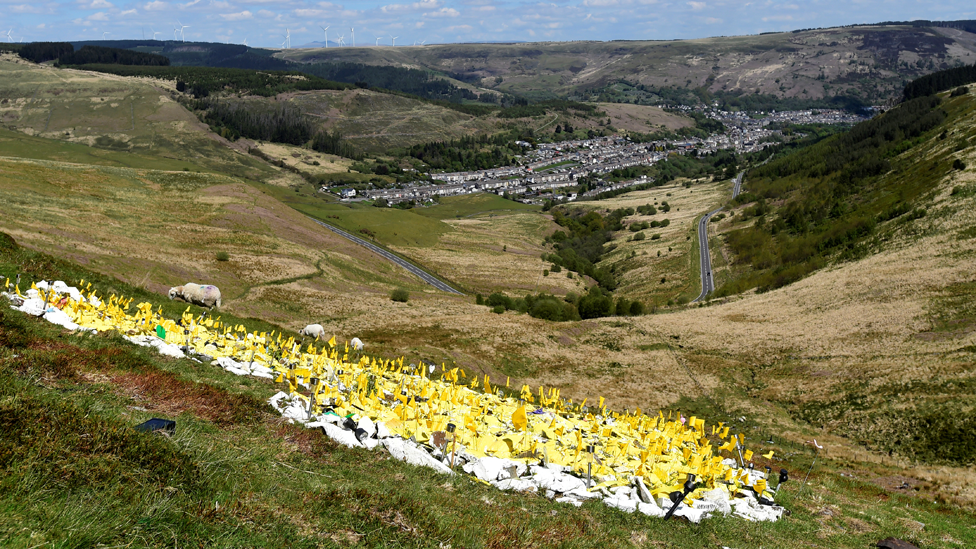
A tribute to those who have died from Covid on a mountain overlooking the Rhondda valley
The death toll for the Covid-19 pandemic in Wales has passed the 8,000 mark, according to the Office for National Statistics.
There were 18 deaths involving Covid-19 in the latest weekly figures, one fewer than the week before.
It takes the overall total since the pandemic began in March last year to 8,002 in Wales.
But there has been a big decline in deaths in the third wave so far, with 102 deaths since the start of June.
During the second wave in December and January, there were an average of 49 deaths a day.
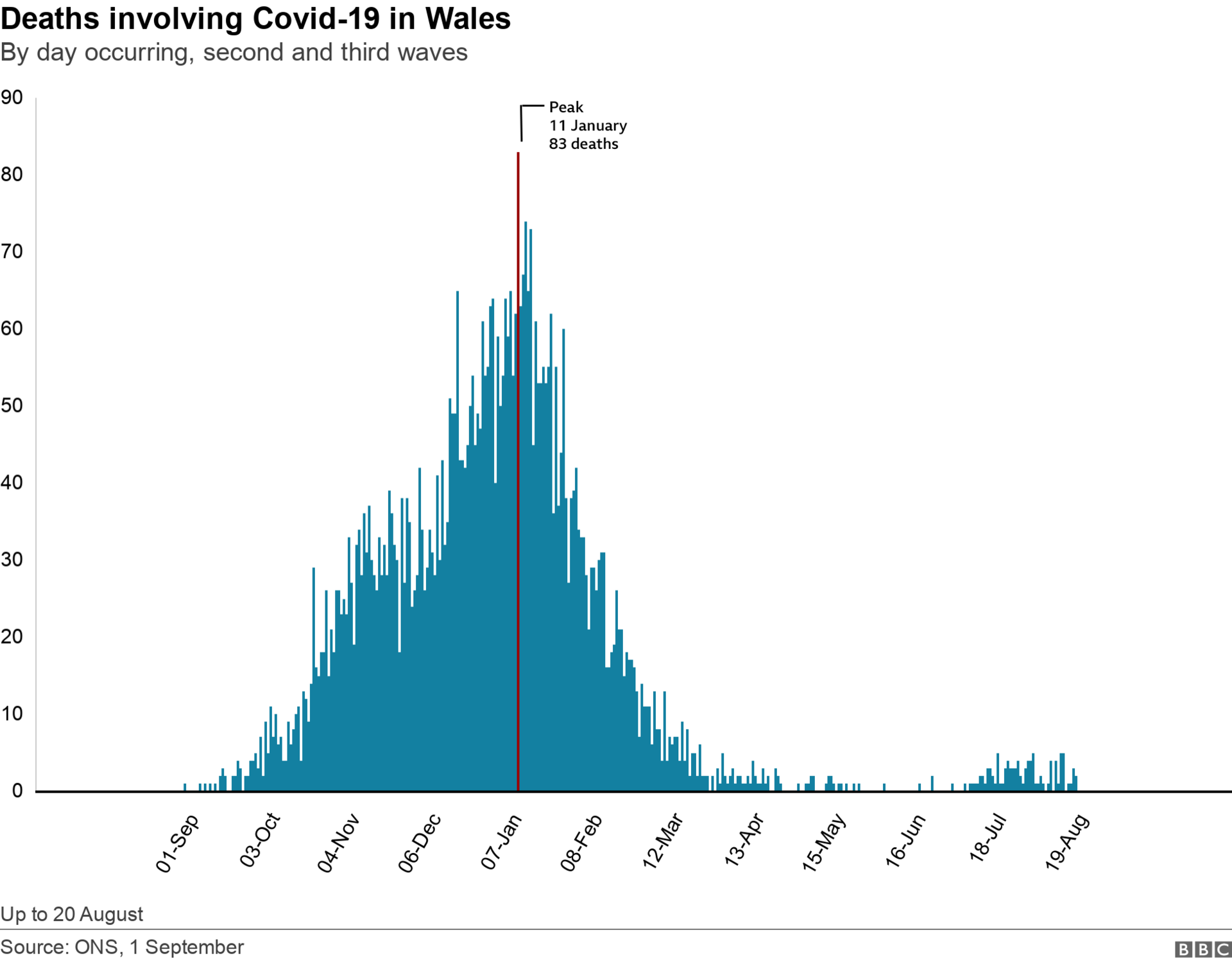

The latest week covers data up to 20 August.
Registrations reported by the ONS , externalinvolve deaths when Covid is suspected or confirmed and when doctors believe it has contributed to a death or is the underlying cause.
The 18 most recent deaths included six hospital deaths in the Betsi Cadwaladr health board area and five in the Aneurin Bevan health board.
There were also three in Swansea Bay and two deaths each in Cardiff and Vale and Cwm Taf Morgannwg.
There were none in Hywel Dda and, for the 11th week in succession, no deaths involving Covid in Powys.


Deaths above normal levels for fifth week
So-called excess deaths, which compare all registered deaths with previous years, were above average for a fifth week in succession. They had been below average for 17 of the previous 24 weeks.
There were 34 deaths above the five-year average in the latest week.
Looking at the number of deaths we would normally expect to see at this point in a typical year is seen as a reliable measure of the pandemic.
The number of deaths from all causes in Wales fell to 598 in the week ending 20 August, with 3% mentioning Covid on the death certificate.
Deaths were also above average in all UK nations for the week, while deaths involving Covid fell in five out of the nine English regions, with the largest decrease in north-east England.
When looking across the course of the pandemic so far, there have been 53,205 deaths from all causes in Wales, with 8,002 (15%) mentioning Covid-19 on the death certificate up to 20 August.
This was 5,290 deaths above the five-year average.
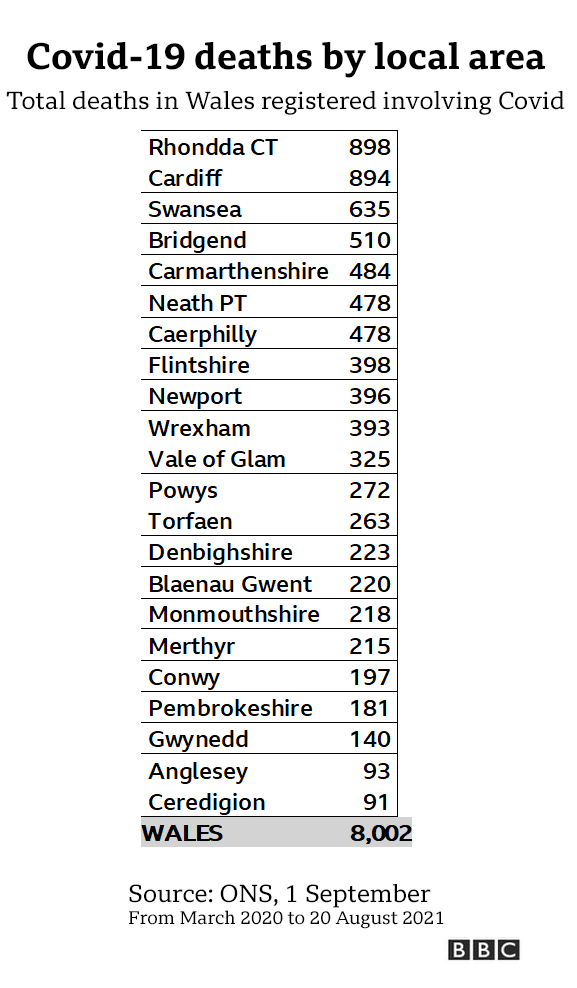

Which areas have been hit?
Rhondda Cynon Taf has had the most deaths with 898, followed by Cardiff.
When population size is taken into account, Rhondda Cynon Taf has the highest mortality rate too - a crude rate of 372 deaths per 100,000 over the course of the pandemic so far. This is seventh highest among local authorities across Wales and England.
The mortality rate in Gwynedd is the 10th lowest across Wales and England with 112 deaths per 100,000.


'More than 90%' still have antibody protection
It is estimated more than nine in 10 adults, or 92% of the adult population in Wales, have antibodies, which can offer protection from Covid.
Thanks to the vaccination programme around 84% of the youngest age group, aged 16 to 24, are estimated to have antibodies present.
The proportion with antibodies in the oldest age group has dropped slightly but is still above 82% of the over-80s.
It is above 90% for all the other age groups, rising to 96.3% for those aged 25 to 34.
The ONS said the percentage of adults testing positive for antibodies remained high but it was "starting to decline slightly in the older age groups".
"Most older people who are vaccinated will retain higher antibody levels than prior to vaccination but may have a lower number of antibodies in the blood at the time of testing," it added.


Rising hospital numbers - but still comparatively low
The key indicators are the impact on hospitals.
Hospital admissions have risen by 40% in a week on average.
These include patients with confirmed Covid, when it is suspected and also recovering patients.
If we just look at those patients with confirmed Covid, there were 313 in hospital beds on Tuesday - a 63% rise on the week before and the highest daily figures since 10 March.
But at the same point in the second wave, at the start of December, there were 1,019 confirmed Covid patients in hospital.
There were 44 Covid patients in critical care or on ventilation on Tuesday, the highest daily number since the start of March, although this was a third higher at the same point in the second wave.
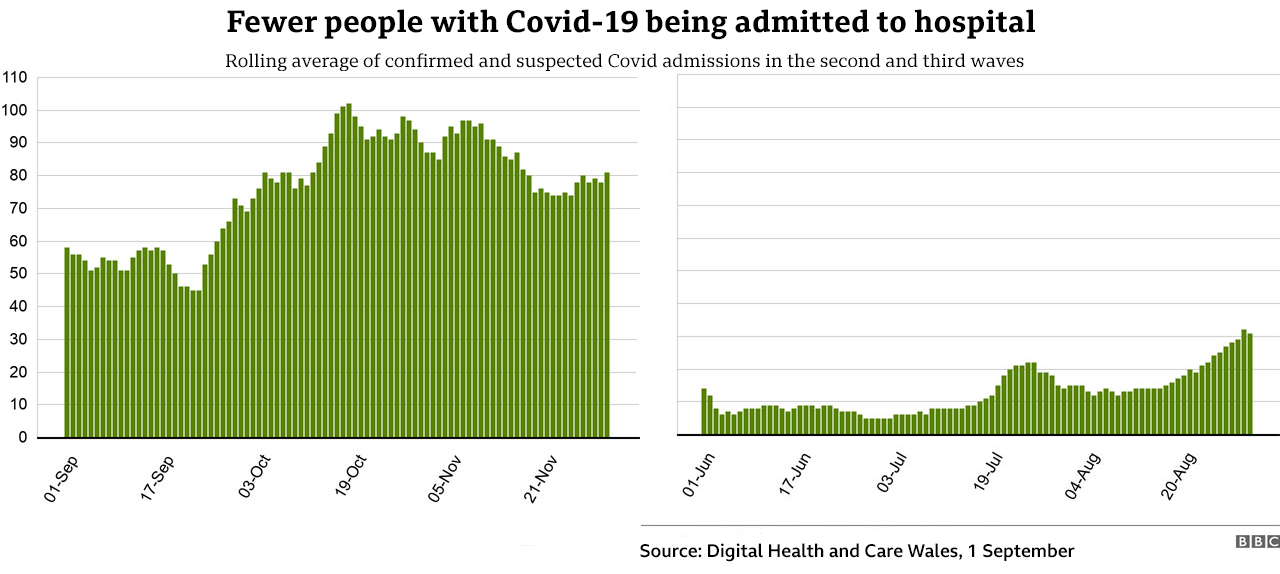

Covid daily admissions have risen on average to 31 confirmed and suspected patients - a 41% rise on the week before.
It was two and a half times greater at the same point in the second wave.
Covid admissions make up 3% of all hospital admissions.
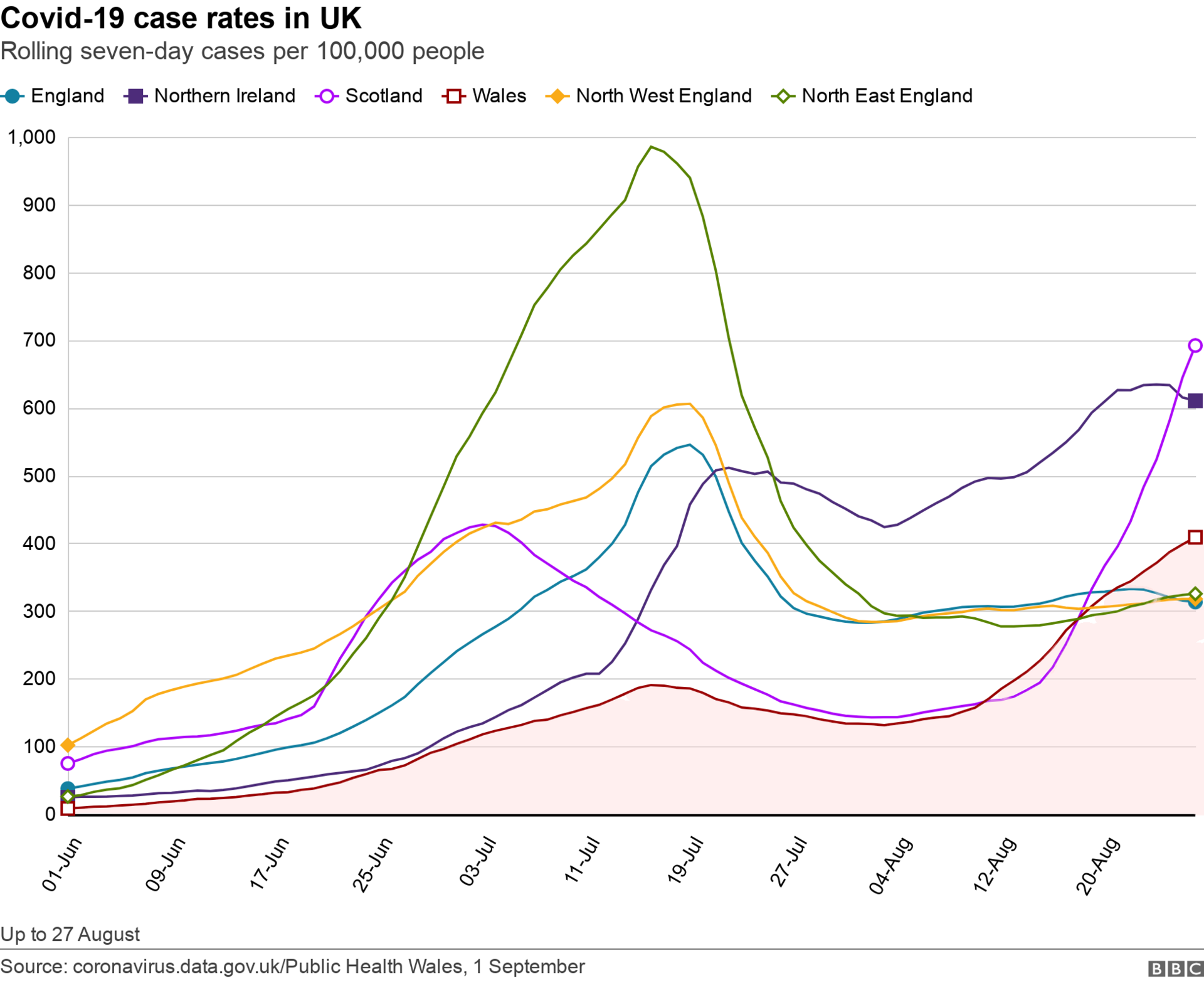
What else have we learned on Tuesday?
The Wales case rate has risen to 408.6 cases per 100,000
It is higher than the case rate in England and every English region but lower than in Northern Ireland and in Scotland, which continues to rise too
The daily average number of cases is 1,792, compared to 1,382 the week before
The "doubling time" - the time it would take to double at this rate - is 13 days, so there are signs of a possible slow-down
The case rate among the under-25s is rising in 14 out of 22 local authority areas in the last week - the biggest increase and highest proportion has been in Swansea
Swansea too has the highest case rate (653.9 cases per 100,000), the 15th highest in the UK, although the biggest rises have been in Merthyr Tydfil, Gwynedd and Neath Port Talbot.
Local hotspots include Barmouth and Dolgellau in Gwynedd, Morriston South in Swansea and Pontardawe in Neath Port Talbot.
There were five deaths reported by Public Health Wales - three of them happened in the Aneurin Bevan health board area and the others in Swansea Bay and Betsi Cadwaladr. Three occurred last Friday and the others on Saturday and Sunday.
There have been 11 deaths in the latest seven days, according to this measure.
- Published28 May 2024

- Published31 August 2021

- Published4 July 2022
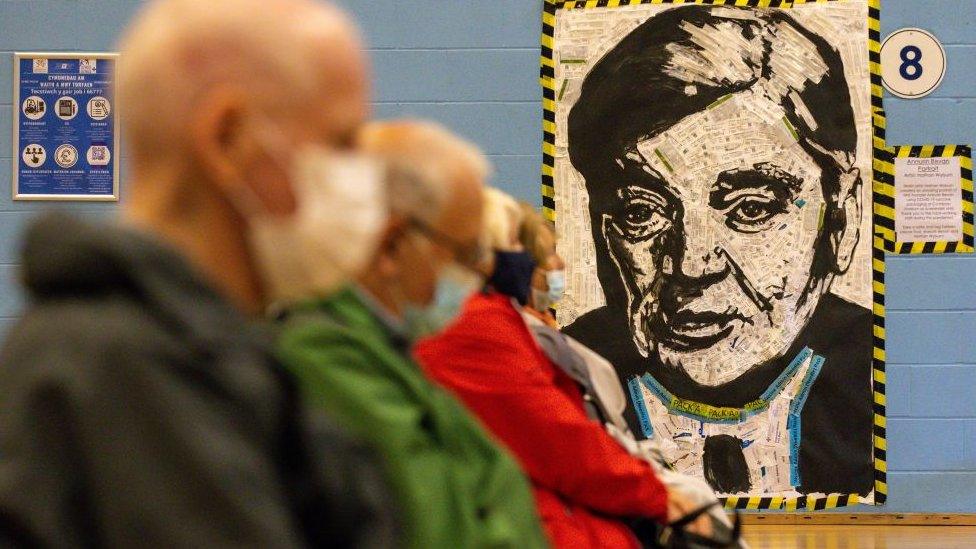
- Published9 August 2021
